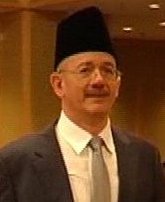
ISMAIL AB JAMAL
AGE: 54 YEARS OLD
CURRENT ENGAGEMENT: SENIOR HR CONSULTANT cum TECHNICAL HR ADVISOR
He has more than 30 years of working experience plus 20 years of HRM and HRD exposures in banking, finance, insurance, highway construction and engineering, an academic at tertiary education, marine transportation, engineering and haulage, SEAGATE storage disc drive technology manufacturing (MNC) and marine heavy engineering industries (ship-building and ship-repair). He has wide exposure in dealing with unionized and non-unionized environments, and also governmental relations. He conducted lectures and training courses in public and private sectors, private universities, colleges and higher learning institutions, presented papers in local and international HRM and HRD conventions, conferences, seminars and workshops, and managed HR consulting assignments in GLCs, PLCs and established organizations. He has championed, participated, implemented and internalized HRM and HRD initiatives. Currently, he is the Senior Consultant cum Technical Advisor with Irshad HR Consulting Sdn Bhd. A regular trainer and facilitator for PERMATA (PETRONAS Management Training Centre) and other established GLCs. A key contributor to KHAZANAH GREEN (Graduate Employability Enhancement) Programme. A prolific public speaker and motivator, he is known to be opened, practical, candour, candid, objective, non-conventional approach and blunt in explaining his comprehension of HR contemporary theories and models. He is contactable at e-mails guru54@streamyx.com or ismail@irshad.com.my or handset: 019-6448764.
AGE: 54 YEARS OLD
CURRENT ENGAGEMENT: SENIOR HR CONSULTANT cum TECHNICAL HR ADVISOR
He has more than 30 years of working experience plus 20 years of HRM and HRD exposures in banking, finance, insurance, highway construction and engineering, an academic at tertiary education, marine transportation, engineering and haulage, SEAGATE storage disc drive technology manufacturing (MNC) and marine heavy engineering industries (ship-building and ship-repair). He has wide exposure in dealing with unionized and non-unionized environments, and also governmental relations. He conducted lectures and training courses in public and private sectors, private universities, colleges and higher learning institutions, presented papers in local and international HRM and HRD conventions, conferences, seminars and workshops, and managed HR consulting assignments in GLCs, PLCs and established organizations. He has championed, participated, implemented and internalized HRM and HRD initiatives. Currently, he is the Senior Consultant cum Technical Advisor with Irshad HR Consulting Sdn Bhd. A regular trainer and facilitator for PERMATA (PETRONAS Management Training Centre) and other established GLCs. A key contributor to KHAZANAH GREEN (Graduate Employability Enhancement) Programme. A prolific public speaker and motivator, he is known to be opened, practical, candour, candid, objective, non-conventional approach and blunt in explaining his comprehension of HR contemporary theories and models. He is contactable at e-mails guru54@streamyx.com or ismail@irshad.com.my or handset: 019-6448764.
